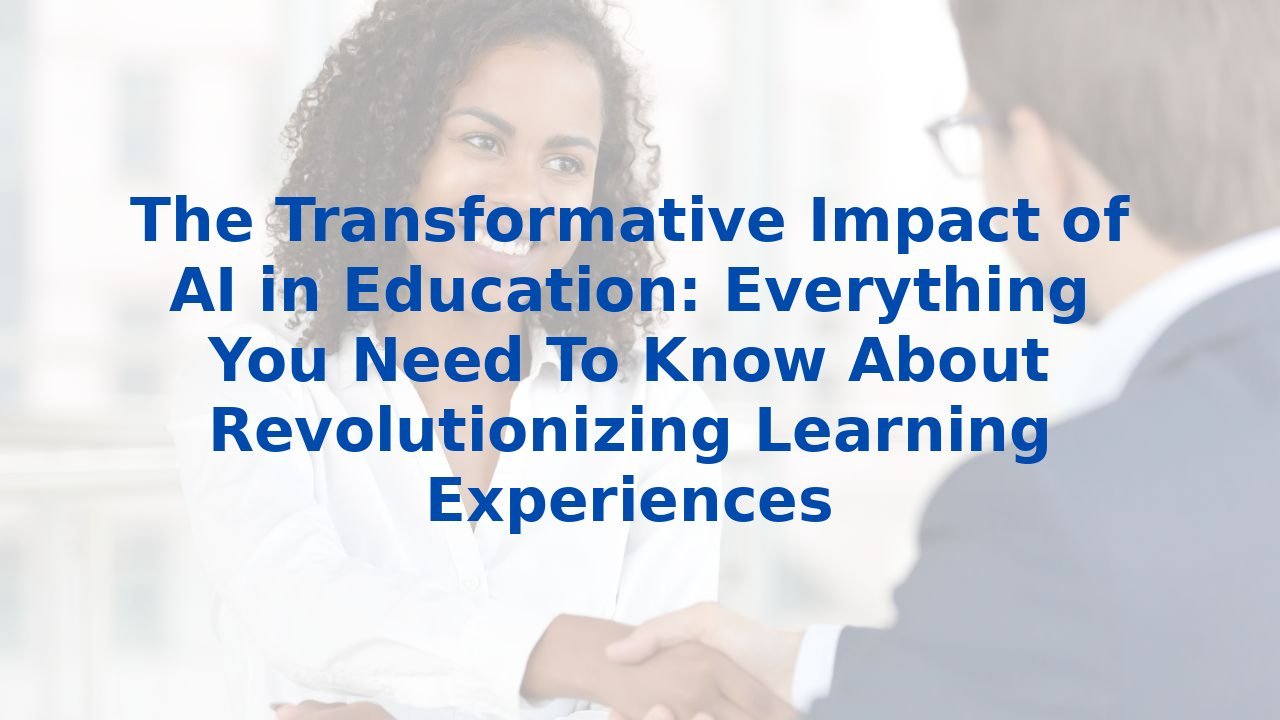The Transformative Impact of AI in Education: Everything You Need To Know About Revolutionizing Learning Experiences
The Transformative Impact of AI in Education: Everything You Need To Know About Revolutionizing Learning Experiences
Artificial intelligence (AI) is no longer just a buzzword; it's a catalyst for change that is reshaping the educational landscape. The integration of AI in education is creating a new paradigm, enhancing the ways students and educators interact with learning material. In this blog post, we will explore the multifaceted benefits of AI in education, particularly focusing on improving efficiency within educational institutions, and the critical role of training educators in this transformation.
Personalized Learning at Its Core
One of the standout capabilities of AI lies in its potential for delivering personalized learning experiences. AI-driven platforms are adept at analyzing data to adapt educational content tailored to each student’s learning style and pace. This means that every student can master concepts in their unique way, at their own speed. As AI continuously processes student responses, it dynamically adjusts lessons and provides tailored feedback and recommendations. This bespoke approach ensures that no student is left behind, fostering a more nuanced understanding of the subjects at hand.
Automating the Administrative Burden
Administrative tasks can often bog down the teaching profession, detracting from the time that educators would ideally spend interacting with students. Here’s where AI steps in as an ally. By automating routine chores—like grading assignments, tracking student progress, and managing class schedules—AI alleviates the burden on educators. This optimization allows teachers to devote their time toward actual teaching, enhancing student engagement and improving learning outcomes.
Enhancing Accessibility for All
A truly inclusive educational environment is one of AI’s significant contributions. AI-driven assistive technologies make learning accessible to students with disabilities, ensuring they receive the same quality education as their peers. For instance, speech recognition software can transform spoken words into text for hearing-impaired students, while tailored educational games can engage young children with diverse learning needs. The goal is clear: to level the playing field and ensure equal learning opportunities for every student.
Continuous Feedback: A Game-Changer in Learning
Timely feedback is essential for student success. AI facilitates this by streamlining the grading process and providing consistent evaluations almost instantaneously. This not only significantly lightens educators’ workloads but also ensures that students receive immediate insights into their performance. The efficiency of AI in this regard creates a swift feedback loop, empowering students to recognize their strengths while pinpointing areas for improvement.
Engaging Students Through Interactivity
Engagement is at the heart of effective education. AI enhances learner engagement by introducing interactive, gamified content designed to captivate students. Programs that employ AI to create quizzes and simulations adapt in real-time to student performance, keeping them motivated and invested in the learning process. Such interactive experiences not only make learning enjoyable but also deepen comprehension by connecting concepts with real-world applications.
The Ethics of AI in Education and the Need for Training
While the merits of AI in education are undeniable, it’s essential to navigate the ethical landscape prudently. Educators must be equipped with the knowledge and skills to harness these technologies responsibly. Training plays a pivotal role in this regard. To cultivate an environment rooted in ethical practices, educators should understand the tools at their disposal and the implications of their use. Comprehensive training ensures that AI is not only integrated into curricula effectively but that it also safeguards student data and privacy.
Empowering Educators through AI Training
Training educators for AI integration serves to enhance the educational ecosystem as a whole. Here are some key benefits of empowering teachers through AI-focused training:
- Enhancing Teaching Methods: With the right skills, educators can leverage AI's capabilities to cultivate dynamic and personalized learning experiences.
- Boosting Efficiency: Trained educators can automate tedious administrative tasks, allowing for more creative and strategic teaching elements.
- Ensuring Ethical Use: Training highlights the importance of responsible AI usage, prioritizing student privacy and data protection.
Conclusion: Embracing the Future of Education
AI is reshaping the educational environment into one that is more efficient, personalized, and inclusive. By automating administrative tasks, offering tailored solutions, and enhancing accessibility, AI is fundamentally altering how education is perceived and delivered. However, to maximize these benefits, institutions need to prioritize ethical considerations and invest in robust training programs for educators. This strategic focus will lead to a richer, more comprehensive learning experience for all students, ultimately transforming the educational landscape for the better.
If you’re ready to embark on this transformative journey, explore AI training solutions suitable for your institution and become a part of the educational evolution.



